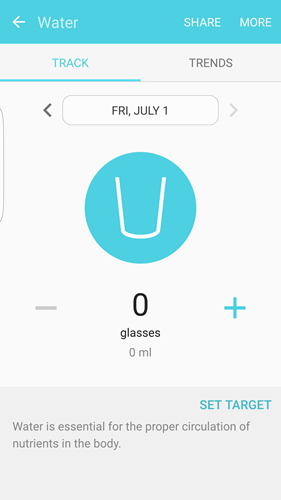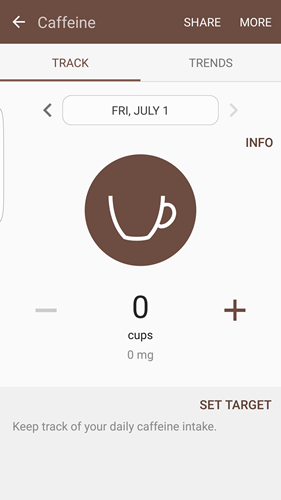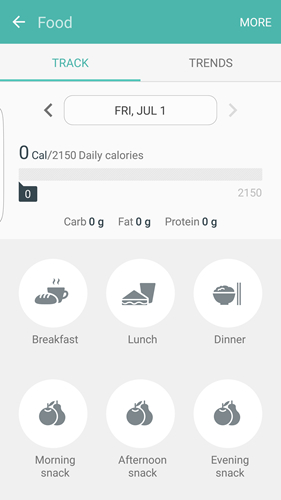Android Data Recovery
How to Record Diet Diary with S Health
With S Health, you can easily "write down" what you eat every day. Better yet, you can get the nutrition details and diet advice from the app. If you want to have a further knowledge, check out the followings.
- Part 1. How to Record Water Intake?
- Part 2. How to Record Caffeine Intake?
- Part 3. How to Record What Food You Have Eaten?
- Part 4. The Benefits of a Healthy Diet
Part 1: How to Record Water Intake?
It is said that each person ought to have at least eight cups of water (250ml per cup) per day to keep the best water intake. Do you reach this goal every day? Use S Health to record your daily water intake or otherwise set target for yourself so as to make sure that you've reached the goal! Water is significant to our health. To some extent, it can also improve skin texture. It is actually better than most cosmetics you apply on your skin every day.Step 1 Tap "Water" Option
You need to run S Health at first. Moreover, if you find no "Water" option on the function section, you have to go to "Manage items" > "TRACKERS", and toggle the "Water" bar so as to enable this function. Then, please tap on it.
Step 2 Record Water Intake
A blue icon of cup will now display on your screen. You can record how many glasses of water you drink today by adjusting the "+" icon or "-" icon. Your daily water intake will be showed at the bottom. Better yet, you are allowed to set target for yourself as to reach the goal of eight glasses of water per day.

Part 2: How to Record Caffeine Intake?
We do like drinking a couple of cups of coffee per day, don't we? But in fact taking excessive caffeine does harm to us as well. Common symptoms of caffeine overdose include dizziness, increased thirst, and diarrhea. The recommended amount of caffeine is usually 400 mg per day for healthy adults. If afraid of having to many cups of coffee each day, try to keep track with your daily caffeine intake and get restrained.The steps of how to record caffeine intake is as exactly same as the above steps of recording water intake, so there will not be extra instructions.

Part 3: How to Record What Food You Have Eaten?
Healthy diet begins with diet diary. If you want to keep fit, you'd better pay more attention to what you have every day. You totally can use S Health to make records of your daily diet. Better yet, S Health no only enables users to check out what nutrients some specific food contain, but offers some advice for the diet.Step 1 Choose "Food" Function
Same as what we mentioned above. After you activate the "Food" function in the app, tap on it and see more.
Step 2 Record Daily Diet
The date will be automatically adjusted. However, if you want to change it, tap on the date and you are able to change it. To record the food you ate, choose the type at first, whether it is your breakfast, lunch , dinner , morning snack, afternoon snack or evening snack. After choosing the type, search for the food and you will get more details for the food, such as its macronutrients, daily values and calorie it contains. Then, enter how many grams you ate and tape "Done". It will soon be recorded, and you can easily check out daily calories on the screen.
Note that if there is no results for your food, you can manually enter how many calorie it contains and add nutrients or request food be added.

Part 4: The Benefits of a Healthy Diet
Control WeightMost people know this one, but it still deserves a place on this list since more than half of Americans are overweight or obese, and obesity contributes to nearly 1 in 5 American deaths. Even if it's only by 5-10%, reducing your body weight can lower blood pressure, improve cholesterol levels and decrease the risk of Type 2 diabetes.
Improve Mood
What you eat has an impact on your brain, including the parts that regulate mood. Although there's no single food that acts as a proven antidepressant, maintaining stable blood sugar through regular, proper nutrition will help you feel better overall on most days.
Combat Diseases
Healthy habits can help prevent certain health conditions—such as heart disease, stroke, and high blood pressure—by helping to keep certain biomarkers, such as cholesterol and blood pressure, within their targets. Regular physical activity and proper diet can help you prevent or manage a wide range of other health problems, including metabolic syndrome, diabetes, depression, certain types of cancer, and rthritis.
Improve Longevity
A diet of fruit and vegetables, in combination with exercise, was associated with extended life expectancy for human beings in their 70s, according to a study in the Journal of the American Geriatrics Society. A healthy diet can play an important role in how long you'll live.

S Health resembles a dietitian on your hand. Track you daily diet and make a healthy diet plan. To enjoy a healthy diet, start with S Health!






















